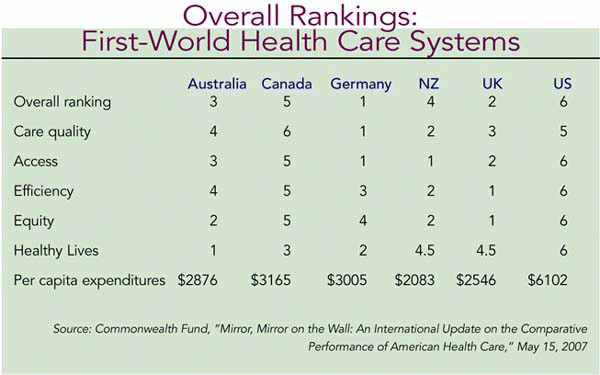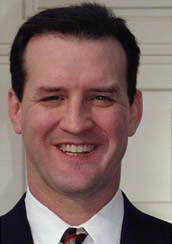Executives, royalty, and even the indigent seeking the world’s best, most advanced medical care find it in the United States. Yet many of the positive aspects of our health care system, including our number-one rating on patient satisfaction by the World Health Organization and our superlative technological innovations, often fall by the wayside because of one glaring deficiency-14.6% of the US population is uninsured. (Never mind that the Federation on American Immigration Reform found that 25 percent of the uninsured are illegal aliens and that they account for 59 percent of the annual growth of the uninsured population.)
Explore This Issue
September 2007Our system often gets a black eye on comparative rankings with other first-world countries because we lack universal access to care. But since few have bothered to compare our track record on the 85.4% of our insured population with similar populations in other developed countries, we continue to rank poorly. The prominent physicians ENToday talked to about the results certainly did.
Comparing the US health care system with those in Canada, Germany, the UK, New Zealand, and Australia, the Commonwealth Fund’s report, Mirror, Mirror on the Wall: An International Update on the Comparative Performance of American Health Care, ranked the American system last (see table below). Karen Davis, PhD, President of the Commonwealth Fund, said: Our failure to ensure health insurance for all and encourage stable, long-term ties between physicians and patients shows in our poor performance… In light of the significant resources we devote to health care in this country, we should expect the best, highest performing health system.
The Commonwealth Fund’s basic argument is that the US health system, the world’s most expensive, globally underperforms because the United States lacks universal health insurance coverage. Other nations, in contrast, ensure the accessibility of care through universal health insurance systems.
The Commonwealth Fund’s findings may disturb some system stakeholders, but many prominent physicians and consultants say otherwise. ENToday plumbed some of the experts in its network to get their reactions to the United States’ ranking on the Commonwealth Fund’s findings. The responses were forceful, disparate, and interesting.
Greensboro, NC-based Steven Feldman, MD, PhD, Professor of Dermatology, Pathology and Public Health Sciences at Wake Forest University School of Medicine and founder of Dr.Score.com , a web site where patients rate their doctors, said: Dead last? I’d like to respectfully disagree with that. While there is certainly a big problem with care for the uninsured in the US, once you get to see a doctor there’s no better place in the world to be. Patients largely love their doctors. According to Dr.Score.com , nearly all patients give their doctors ratings of 9 out of a possible 10. Otolaryngologists, in particular, were among the highest rated specialties.
Gerard Gianoli, MD, of Baton Rouge, LA, an ENToday board member, said that Mirror Mirror is largely based on myths, and that if one compares costs of a procedure by country there’s not a lot of difference. As for access to health care, he considers the United States superior: Everyone in the US who needs a cochlear implant gets one. Even if you’re uninsured, Medicaid or someone else will get it done. Recently a Canadian colleague told Dr. Gianoli that cochlear implants are limited there, that his 2008 surgery schedule is filled, and that Canadians who don’t want to wait cross the border for surgery Summing up, Dr. Gianoli compared socialized medicine to oil change insurance-when dollars go to routine procedures, there’s little left for big-ticket items.
CLS, a blogger on http://freestudents.blogspot.com , a classically liberal blog, attacked the erroneous assumptions about the American health care system’s costs with gusto: Americans spend more per capita on automobiles than do Nigerians. Is there an American car crisis? Americans spend more per capita than many nations because we have a higher standard of living. CLS pointed out that the same Americans who are considered well-off when buying cars, chocolate, or cosmetics are considered worse off by advocates of socialized medicine. The assumption in much of the world is that American health care is significantly inferior because Americans spend more per person than do people in other wealthy nations. CLS wrote: Today people want the best care money can buy. For example, in the US about 25 million MRI scans are performed per year, up from 1.8 million in 1990. This cost didn’t exist in the ’80s because the technology didn’t exist. Abolishing technologies such as MRIs would lower health care costs significantly, but people would suffer, there would be more deaths, but it would be cheaper. CLS’s clincher: Is America overspending on health care? No doubt. But it is likely that state systems are underspending. The extra money that Americans spend is one reason there aren’t queues for needed surgery.
Consultant JoAnn Laing of Ridgefield, NJ, cited the late US Senator Daniel Patrick Moynihan’s quip: Everyone is entitled to their opinion, but not their own facts. She finds the Commonwealth Fund’s survey self-serving, questioning its methodology and structure. Of our system, Ms. Laing said: Most nations look to the US for medical advances and the technology and treatments we develop. Why else do the wealthy from other countries come to the US for medical treatment? We’re not perfect, but we have a concern for patients and their needs. In other first-world countries patients wait in pain for months for procedures. In a nation that devotes 16% of its GNP to health care, I believe we do a good to excellent job.
Room for Improvement
Although most ENToday sources commended the US health care system for its quality and access, others agreed with the Commonwealth Fund’s poor ranking. Carter Multz, MD, an internist/rheumatologist from San Jose, CA, who has been in practice for more than 40 years, said: Health care in America is too expensive because it is catawampus, askew, awry, and uncoordinated. But we can have universal health care, including pharmacy, improve quality, save lives, and save billions of dollars, easily and simply. Dr. Multz targeted wasteful administration as the culprit, noting that nearly 50% of our $1.9 trillion health care spending goes to administration, versus Canada’s 15%. He advocates a uniform PC-based system tracking authorization, utilization, quality control, claims management, and payments, with Congress eliminating antitrust laws that prevent efficient management.
Michael Jhin, MD, the former CEO of Houston’s St. Luke’s Episcopal Health System and a mechanical engineer, says that American health care providers might emulate Toyota Motors’ efficiencies to improve quality and efficiency. If our health care costs are not globally competitive, how can any of our industries compete in the global marketplace? How can we reduce costs, improve safety and reduce waste? he asked. Using Toyota’s emphasis on beachfront property-the area closest to employees to reduce waste and allow for more value-added services-Dr. Jhin improved his hospital system’s central supply area’s efficiencies by 40%. It completed more cases in less time, with fewer employees. Dr. Jhin added: American health care possesses enviable components for a world-class system. Yet we lack the system engineering to enjoy the full value of those hard-earned components.
Pennsylvania-based Geisinger Health System has followed a quality improvement program similar to those advocated by Dr. Jhin. Guaranteeing its workmanship, the health plan charges a flat fee for elective heart bypass surgery, plus 90 days of follow-up. Geisinger improved quality and efficiency by devising a consensus list of 40 best practice action items for bypass surgery. Its surgeons boosted adherence to the guidelines from 59% to 100% of the time, Now, if any preoperative measure is left undone, the procedure is scrapped. Efforts such as Geisinger’s may reduce the wide variations in treatment outcomes.
Several experts tied the poor US rankings on quality to other problems. Jim Goyjer, a native of the Netherlands who is now a Los Angeles-based public relations consultant, decried that health care is a for-profit business in the US. Everyone in this country does not share the burden of health care for all. It is a travesty that the richest country in the world cannot provide basic healthcare to its citizens. Richard Salluzzo, MD, CEO of Wellmont Health Systems, headquartered in Kingsport, TN, says that the US system wastes $17 billion annually in preventable medical errors. Multiple organizations and initiatives have addressed patient safety and quality piecemeal. No organization has taken a total solution approach to combat the growing epidemic of medical errors in hospitals. He hopes to address that through a Safest Hospital Initiative consortium involving Wellmont, Adventist, and Novant Health Systems.
The deeper we delve into the issues surrounding health care quality, access, equity, and affordability, the more complex a balanced solution becomes. The Commonwealth Fund’s Mirror Mirror survey, with its snapshots of how the developed world delivers health care, gives us additional food for thought.
Additional Resources on Health Care Quality
- Institute of Medicine: www.iom.edu
- Agency for Healthcare Research and Quality: www.ahrq.gov
- U.S. Department of Health and Human Services: www.aspe.hhs.gov
- Institute for Healthcare Improvement: www.ihi.org
- Center for Healthcare Strategies: www.chchs.org
©2007 The Triological Society


Leave a Reply